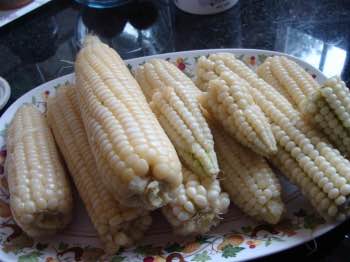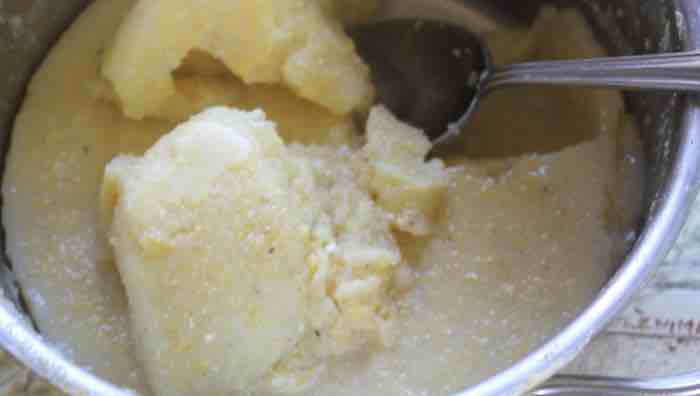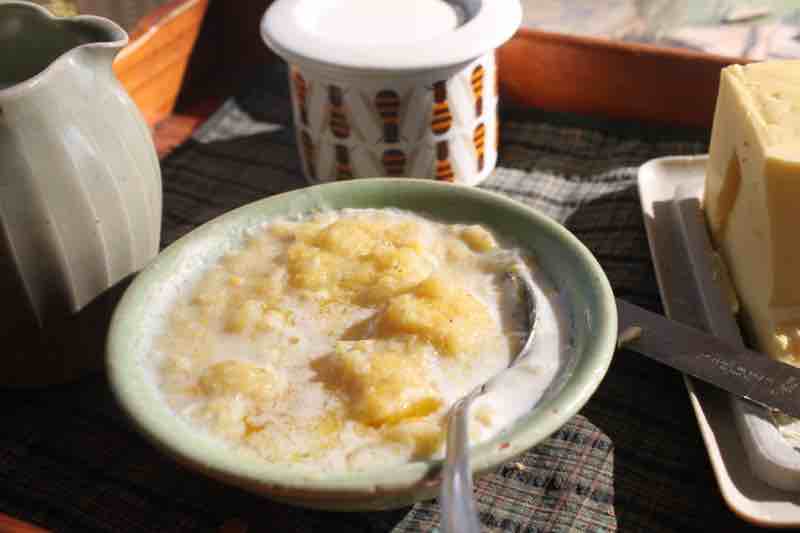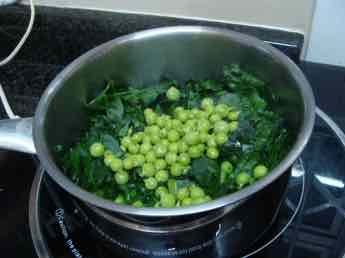Reheating resistant starch
Reheating resistant starch is a very common question since banting began. Thank goodness we can again enjoy potatoes, corn and pasta; but I do not particularly like them cold.
Really the word diet needs to be totally banished from our thinking; none of them work because they are not sustainable. However, giving up starches has worked for a lot of people; but can you abandon bread, potatoes and corn for ever. And is it actually necessary? Pasta remains a thorny question.

No, it is not necessary and in fact it is not the right thing to do. Starchy
foods like butternut, apples and beans contain many of the vitamins, minerals and phytochemicals that our bodies desperately need; and whole grains too.
We can avoid them in the short term for the greater good of losing 30 or more pounds but for a long period it is not an advisable way to live. The loss of beta-carotene alone would be very serious.
Whole grains especially are strongly associated with greater well-being. If you abandon them and turn to large amounts of animal fat and protein for energy, you will simply get cancer instead of developing diabetes.
Can you have your cake and eat it?
The good news is that you can have your cake and eat it.
Well, that is an unfortunate metaphor in this instance; cake has zero resistant starch and it should be kept for high and holy days, and you cannot reheat it in any case. It will make you fat and will certainly downgrade your lifespan. Whether it is the refined white flour or the sugar, it is total bad news; once a year on your birthday and perhaps a couple more times just so that you can deny that you have become orthorhexic is fine, but for the most part, avoid it.
But you can enjoy butternut, legumes and whole grains provided you understand reheating resistant starch.
Reheating resistant starch
Reheating resistant starch is for those on the Paleo and Banting meal plans for weight loss but really also for all who are concerned about a healthy environment in the colon for the normal flora. Without the fibre in these unrefined starchy foods, the bugs are doomed; and you with them. It would mean little short-chain fatty acids like butyrate; that is a recipe for poor health.
Firstly then, what is resistant starch?
Starches can be divided roughly into three groups.
- Rapidly digested starch; that in the main is your cake and colas but also boiled or baked potato from cold storage, for example.
- Slowly digested starch; these would include legumes some of which are turned into glucose and absorbed in the small intestine but because of the fibre, they are not at all like white bread and precooked rice.
- Resistant starch; these are carbohydrates that pass straight through the small intestine without being assimilated, reaching the colon where they act as prebiotics for the normal flora. Instead of being broken down into glucose, they are turned into essential short chain fatty acids; some call them indigestible since they get through the SI largely unaffected.
Often that means cooling your potato, corn grits and pasta in the fridge overnight, a process called retrogradation. But is reheating resistant starch an option? Yes, it certainly is.
Retrogradation of starches
 Retrograded grits
Retrograded gritsIt may be that this is a whole new subject to you; and there are all these impossible terms like reheating resistant starch and retrogradation of your carbs. Do not switch off. We were all there but, determined to enjoy being in fine fettle we persevered and discovered to our surprise that in fact we could enjoy our pasta and potatoes again; and not get those unwanted blood-sugar surges, putting on unwelcome pounds.
A registered dietician gives a beautiful explanation of this process at SELF[4].
Yellow corn
There's a good reason why we generally choose yellow over white maize; whether as corn on the cob or as grits, known as polenta. It's all about a very important nutrient called beta-carotene, the precursor of vitamin A; it has more protein and less starch too.
South Africans make the great mistake of choosing white maize; consequently 20 children die every single day from a vitamin A deficiency. Kwashiorkor, a protein deficiency and obesity are rife.
 The better option
The better optionThe starches in potatoes, corn and pasta normally are digested by
enzymes in the small intestine and absorbed as glucose. In essence, that
is quite normal but you would want to limit it so that you do not get a
surge in blood sugar; ideally some of the amylose and amylopectin chains
should reach the colon where they are greedily fed upon by the normal flora. Those are the bugs that scientists call the microbiome.
There they break down not into glucose but very important short-chain fatty acids for our immune systems; they also supply energy to the cells lining the gut.
When you boil a potato in water the two starchy constituents, amylose and amylopectin, lose their crystalline structure, absorbe water and form a gooey solution that the enzymes in the small intestine can devour; and turn instantly into sugar. That is bad news if you have too much.
But if you first cool that potato before eating it, those molecules again form a crystalline structure with strong hydrogen-bonds bridging them; and making it more difficult for the enzymes in the small intestine to digest them. This is known in biochemistry as retrogradation. It is a very important word you should grasp if you want to lose weight permanently without all the pain and futility associated with dieting.
 Must we really avoid green peas?
Must we really avoid green peas?But the problem of course is that we often do not like cold mashed potatoes, spaghetti bolognese and green peas; and corn on the cob. Is reheating resistant starch a possibility?
Yes, it is; scientists have found to their surprise that reheating your cold spuds and pasta actually lowers the expected surge in blood-sugar even more. You really can have your potato, and eat it.
Instead some of your carbs when cooked, then cooled and again reheated pass through the small intestine into the colon as resistant starch where they are fermented by the friendly probiotic bacteria; rather than forming simple sugars with all the potential problems of obesity, diabetes and glucose intolerance they are turned into those important short-chain fatty acids.
Yes it is complicated but those who have an aversion to pills and pain will apply their minds to understanding the science; this simple vs complex carbohydrate page will give you another slant. Neither are good or bad; only different.
Retrograded potato salad recipe
Preparation time: 25 minutes, but they must overnight in the fridge once cooked.
Ingredients:
- One large potato per person, plus one extra.
- Spring onions and parsley.
- Any cold-pressed oil; obviously from the olive is first prize, but vary it with a nut fat like from the macadamia perhaps.
We recommend avoiding seed oils; they are inflammatory and will just make your joints, muscles and blood vessels angry.
Go for it:
- Peel your spuds unless you are lucky enough to find new potatoes. Boil them until tender; better still pressure-cook them for ten minutes.
- Drain off the water and cool the potatoes; place them in the fridge, preferably overnight. This when retrogradation happens.
- Chop the potato into smaller pieces; sprinkle with finely-chopped spring onions and parsley. Drizzle with your cold pressed oil. Add salt and black pepper to taste.
- As an alternative you could now place your cold potatoes into a hot oven for twenty minutes; turn once. Even further retrogradation will occur.
The material expressed on this page is gleaned from the nutritional and environmental literature; it is clearly referenced. A plain distinction is made between the author's opinion and that which is scientifically proven. When in doubt consult your health professional.
To suggest a correction or clarification, write to Dr Bernard Preston here. Contact.
Grow your own potatoes
I used to think that how to plant potatoes
was only for the larger garden but since it's so difficult to get new
spuds, it is still best to grow your own; pop in a few chats as they are called between your
flowers. The moles and wilt will also find it more difficult to locate
them; in full sun remember.
So you see, reheating resistant starch really is an option. The bugs in your colon will love it; and reward you with greater well-being and an improved immune system.
How do potatoes help your immune system?
Well this is complex immunology but to put it as simply as possible, researchers have shown that a short-chain fatty acid called butyrate produced in the large bowel by fermentation of resistant starch that has passed safely through the small intestine, induces colonic T regulator (suppressor) cells[1].
These suppressor cells are crucial for tolerance of any partially undigested proteins like gluten that would otherwise provoke an immune reaction. In short they would cause inflammation, both locally in the colon causing angry bowel disease and colorectal tumours; but also elsewhere in the body.
Thus conventionally potatoes are included alongside polished rice, refined flour and pasta as pro-inflammatory foods that we should avoid or at least strictly limit.
But boiled spuds that have been cooled and reheated to form resistant starch are another whole ballgame; so too are new potatoes.
Frankly I cannot blame you for for being utterly confused; so was I until I started reading the research and trying to get my mind around why reheating resistant starch was an important subject. That's what I did when I discovered that I was prediabetic; along with nearly half of all adults enjoying typical grocery store food. Now my HbA1c is 5.4; perfect.
Eat your potatoes, just not too many if they are hot and white; cool them when possible first. Always choose red and new spuds given the option.
It's all about caring for our own health.
Orthorexia
Beware of the neurosis known as orthorexia. If you go out to dinner and your hostess offers you freshly-boiled white potatoes, do not get huffy and puffy and give a lecture, but just ask for a small portion; add some butter. So says Bernard Preston, lover of life and good food.
One of the joys of cooking from scratch is that it gives back to you control of your well-being. For example, salt causing high blood pressure is not likely to be an issue if you are enjoying all those foods rich in potassium. But young men with even mild hypertension do need to be wary.
We believe that by investing time on wellness you end up spending far fewer hours sitting in doctor' consulting rooms and at the pharmacy. So half a morning used planting old potatoes in your garden is certainly not wasted. Once you have tasted newly-harvested spuds you will never go back to those from cold storage.
"Health nuts are going to feel stupid someday, lying in hospitals dying of nothing."
- Redd Foxx
Some health nuts plan to grow old gracefully and one night die of nothing; not in hospital but in their own beds.
It's an interesting thought; could one die healthy, simply of old age?
When browsing use right click and "Open Link in New Tab" or you may get a bad gateway signal.
Newsletter
Our newsletter is entitled "create a cyan zone" at your home, preserving both yourself and Mother Earth for future generations; and the family too, of course. We promise not to spam you with daily emails promoting various products. You may get an occasional nudge to buy one of my books.
Here are the back issues.
- Lifestyle and ideal body weight
- What are ultra-processed foods?
- Investing in long-term health
- Diseases from plastic exposure
- Intensive lifestyle management for obesity has limited value
- A world largely devoid of Parkinson's Disease
- The impact of friendly bacteria in the tum on the prevention of cancer
- There's a hole in the bucket
- Everyone is talking about weight loss drugs
- Pull the sweet tooth
- If you suffer from heartburn plant a susu
- Refined maize meal and stunting
- Should agriculture and industry get priority for water and electricity?
- Nature is calling
- Mill your own flour
- Bake your own sourdough bread
- Microplastics from our water
- Alternative types of water storage
- Wear your clothes out
- Comfort foods
- Create a bee-friendly environment
- Go to bed slightly hungry
- Keep bees
- Blue zone folk are religious
- Reduce plastic waste
- Family is important
- What can go in compost?
- Grow broad beans for longevity
- Harvest and store sunshine
- Blue zone exercise
- Harvest and store your rainwater
- Create a cyan zone at your home
Did you find this page interesting? How about forwarding it to a friendly book or food junkie? Better still, a social media tick would help.
Address:
56 Groenekloof Rd,
Hilton, KZN
South Africa
Website:
https://www.bernard-preston.com